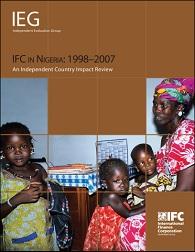 IEG's Country Impact Review examines the effectiveness of IFC's operations in Nigeria from July 1998 to December 2007. In particular, this study evaluates whether IFC: successfully defined a relevant and appropriate strategy for helping Nigeria tackle its most pressing needs; provided investment and advisory services that were reflective of IFC's strategy; and achieved positive development results.
IEG's Country Impact Review examines the effectiveness of IFC's operations in Nigeria from July 1998 to December 2007. In particular, this study evaluates whether IFC: successfully defined a relevant and appropriate strategy for helping Nigeria tackle its most pressing needs; provided investment and advisory services that were reflective of IFC's strategy; and achieved positive development results.
Overall, companies reported highly positive impacts as a result of their corporate governance changes. Companies made improvements at all levels of the organization from the board level to the management level. This report highlights common improvement themes that emerged across all of the companies and provides an aggregate view of the impacts achieved.
The main findings of this Review are:
- IFC achieved significant results in the financial sector, initially by providing long-term financing, and later as a source of risk mitigation. Eighty-two percent of IFC-funded projects in this sector achieved satisfactory or better ratings in development and investment outcomes. However, the environment and social effects of financial sector projects were rated poor, with only 10% achieving satisfactory results. IFC's support for the introduction of mobile phones in Nigeria also had a significant impact.
- IFC investments in Nigeria were heavily concentrated in the financial sector (66% of commitments). While IFC recognized the critical importance of infrastructure development , and repeatedly emphasized infrastructure as a strategic priority for IFC, it failed to sustain its efforts to develop a sustainable program in the sector. IFC had limited or no presence in other areas of strategic priority such as agribusiness, oil and gas, and manufacturing.
- IFC's country strategy in Nigeria was poorly integrated with IFC's main strategy and budget process; country objectives and priorities in terms of sectors and products were not well formulated; and there was little or no resource allocation.
- In advisory services, 42% achieved satisfactory impact achievement ratings. The low rating was a result of two main factors: (i) poor client uptake; and (ii) transition in the IFC delivery platform.
Methodology
This study used standard IEG-IFC evaluation guidelines as the basis for rating advisory and investment operations, and compared their ratings to those of relevant peer groups. The study population included 45 investment projects (US$ 1.1 billion) and 39 advisory projects (US$ 20 million). The data collection included site visits, stakeholder interviews, AC Nielsen client surveys, and use of local strategy consultants. Furthermore, the study team reviewed project and strategy information and evaluation results disclosed by other donors, and World Bank Group and external databases pertaining to Nigeria's economic development and business climate. The scope of the study does not include the following programs: (i) Africa Enterprise Fund (AEF); (ii) Africa Project Development Facility (APDF); and (iii) African Management Service Company (AMSCO).
Recommendations
To enhance its development effectiveness in Nigeria, IEG recommends that IFC:
- Diversify its areas of intervention in Nigeria to: (i) help address development challenges related to poor infrastructure and excessive dependence on the oil sector; (ii) contribute to the trickle-down effects of oil-driven growth; and (iii) expand viable IFC private sector activities beyond the present narrow confines of operations in terms of sectors;
- Improve the process of developing country assistance strategies for key countries such as Nigeria by: (i) strengthening the country focus of IFC's strategy process including enhanced coordination with the World Bank; (ii) formulating country objectives in terms of expected development impacts; and (iii) linking objectives with the allocation of organizational resources; and
- Ensure that proper priority and resources are given to supervision of environmental and social effects in Nigeria. IFC should fully integrate environmental and social supervision into the portfolio management process, and ensure accountability.